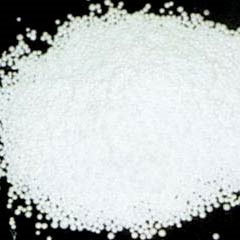|
|

Polystyrene
abbreviated following ISO Standard PS, is an aromatic polymer made
from the monomer styrene, a liquid hydrocarbon that is manufactured from
petroleum by the chemical industry. Polystyrene is one of the most widely
used plastics, the scale being several billion kilograms per year.
Polystyrene is a
thermoplastic substance, which is in solid (glassy) state at room
temperature, but flows if heated above its glass transition temperature of
about 100 °C (for molding or extrusion), and becomes solid again when
cooled. Pure solid polystyrene is a colorless, hard plastic with limited
flexibility. It can be cast into molds with fine detail. Polystyrene can be
transparent or can be made to take on various colors.
|
Properties |
|
Density |
1.05 g/cm3 |
|
Density of EPS |
16–640 kg/m3[4] |
|
Dielectric constant |
2.4–2.7 |
|
Electrical conductivity (s) |
10−16 S/m |
|
Thermal conductivity (k) |
0.08 W/(m·K) |
|
Young's modulus (E) |
3000–3600 MPa |
|
Tensile strength (st) |
46–60 MPa |
|
Elongation at break |
3–4% |
|
Notch test |
2–5 kJ/m2 |
|
Glass transition temperature |
95 °C |
|
Melting point[5] |
240 °C |
|
Vicat B |
90 °C[6] |
|
Linear expansion coefficient (a) |
8×10−5 /K |
|
Specific heat (c) |
1.3 kJ/(kg·K) |
|
Water absorption (ASTM) |
0.03–0.1 |
|
Decomposition |
X years, still decaying |
Solid polystyrene is used,
for example, in disposable cutlery, plastic models, CD and DVD cases, and
smoke detector housings. Products made from foamed polystyrene are nearly
ubiquitous, for example packing materials, insulation, and foam drink cups,
etc..
|
|